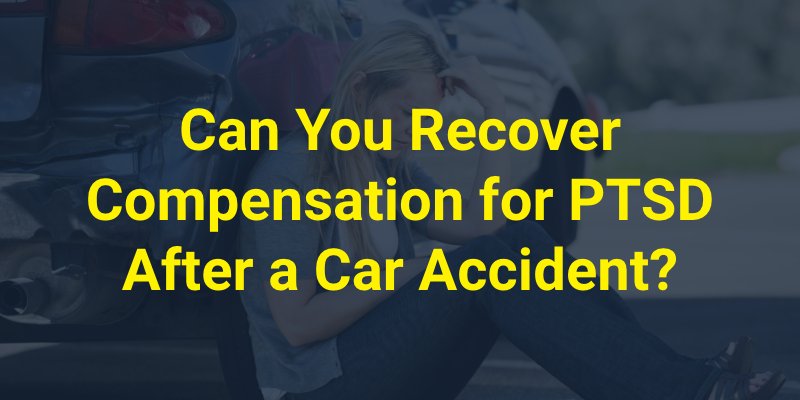Car accidents are undoubtedly traumatic events, often leading to physical injuries that can be life-altering. The psychological trauma and distress that one experiences – like post-traumatic stress disorder (PTSD) – can also have a profound impact on victims’ lives.
Some studies report that motor vehicle accidents are actually the leading cause of post-traumatic stress disorder (PTSD) in the general population.
Recovery from this psychological injury is equally important as recovering from your physical wounds. So, can you claim compensation as a result of these emotional injuries? In many cases, yes. However, consulting an attorney experienced in car accident claims involving PTSD becomes essential for helping you claim what may be owed to you.

First, it’s helpful to understand what exactly PTSD is.
Victims of car accidents often experience an array of distressing emotions and symptoms immediately afterward. You may feel shock, guilt, grief, a sense of helplessness, confusion, or intense fear when recalling the incident.
“Posttraumatic stress disorder (PTSD) is a psychiatric disorder that may occur in people who have experienced or witnessed a traumatic event, series of events or set of circumstances.”
The most common symptoms typically include:
Intrusive Memories/Flashbacks: You might frequently relive the incident through recurring and unwanted thoughts or images of the accident.
Nightmares: The trauma could invade your dreams, turning restful sleep into anxious nights.
Aggression/Irritation: Many individuals find their demeanor changing post-trauma; they become easily angered or irritated over seemingly trivial matters.
Avoidance: Many people suffering from PTSD will avoid activities, places, and anything else that reminds them of the incident. For example, a person with PTSD after a car accident may avoid driving or being near the road where they were injured.
Difficulty Enjoying Activities: It’s common to lose interest in hobbies that you previously loved and enjoyed participating in.
An Increased Startle Response: Victims often become jumpy after the accident, indicating a heightened state of anxiety.
Damaging Behaviors And Risky Activity: You might adopt and exhibit behaviors that put your health and safety at risk, a reaction to trying to deal with distressing memories or numb negative feelings associated with the accident.
Coping with these symptoms on your own can be difficult, as they impact both personal and professional aspects of your life. Given the significant effect PTSD has on quality of life, it’s essential to include this aspect in an auto accident claim or lawsuit when possible.
Filing a claim for compensation due to PTSD resulting from a car accident is possible, but can be a challenging process, mainly because the impairments are mental and emotional, rather than physically visible. In our society, there’s unfortunately more stock placed on injuries than we can actually see. Here’s what you need to know if you’re trying to obtain compensation for this psychological injury:
First and foremost, you’ll need an official diagnosis from a qualified medical professional linking your PTSD directly to the car accident. This is essential as it validates your claim of psychological injury.
Compensation for PTSD resulting from a car accident is highly individual and depends on the specific circumstances of your case. There is no standard settlement amount as the severity of symptoms, prognosis, loss, and impact vary significantly among individuals.
However, attorneys well-experienced in this area can collaborate with medical and psychological experts who specialize in assessing these types of impacts on individuals. By evaluating different facets such as medical expenses associated with treating your emotional distress and diminished quality of life, attorneys can figure out calculations to estimate recovery amounts for you.
Various other factors can exert influence on the claim for PTSD following a car accident, each of which shapes your potential to recover damages:
Liability: Demonstrating that someone’s negligence caused your injury is critical. If you share in the liability, it will reduce your recovery amount.
Physical Injuries Linked to Psychological Trauma: Having physical symptoms associated with trauma will lend credence to mental health claims. This will often allow you to obtain more compensation.
Pre-Existing Conditions: Pre-existing mental or physical health matters might complicate a claim. However, if it can be shown that your trauma has exacerbated these conditions, you can still secure compensation.
Income Loss/Work Deficits Due to PTSD: Demonstrating the financial impact suffered due to an inability to perform at work is another piece of evidence for higher compensation.
Relationship Impact: If your relationships, whether familial or interpersonal, have suffered as a consequence of PTSD from an accident, it strengthens the claim that you’re coping with serious emotional distress.
Typically, the more severe impact your emotional injuries have on your life, the more likely you’ll be able to obtain recovery and the higher it should be.
Securing legal representation for a PTSD claim after a car accident is vital due to the complex nature of these types of cases. It’s crucial to remember that insurance companies summarize their bottom-line objectives into two categories: increasing income and decreasing expenses.
It’s not unusual for insurance companies to dispute or deny these claims, citing a lack of visible physical harm. They might argue that your psychological symptoms sprouted from causes other than the accident or perhaps even suggest they’re not genuine.
An experienced injury attorney can counteract such strategies with medical evidence and testimonies from mental health professionals that link your PTSD directly to your traumatic event. They will fight voraciously on your behalf for the compensation you deserve, ensuring you receive the best possible outcome in a disputed claim or even represent you in trial proceedings if necessary.
When it comes to recovering everything you should be entitled to following an accident, pursuing legal representation could make all the difference. If you need help, don’t hesitate to contact us to schedule a free consultation with a car accident attorney.